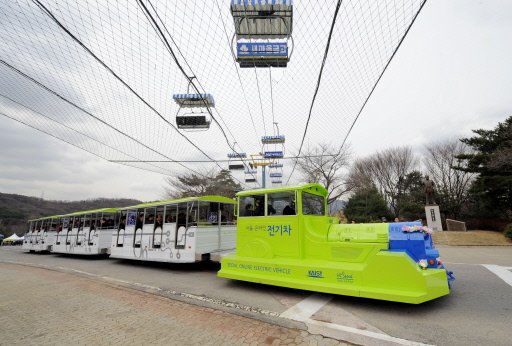
The Online Electric Vehicle (OLEV), towing three carriages, runs along a blue line under which power strips are buried for recharging, at an amusement park in Gwacheon, south of Seoul. S.Korean researchers launched an environmentally-friendly public transport system using a "recharging road" -- with a vehicle sucking power magnetically from buried electric strips. Photograph by: Jung Yeon-Je, AFP
The world’s first On-Line Electric Vehicle (OLEV) debuted Tuesday at the Seoul Zoo in Gwacheon, Gyeonggi Province.
Seoul City decided to introduce the OLEV at the zoo last August, replacing its shuttle called the “Elephant Train.” The old shuttle, a modified truck, began running in 1984. However, it used diesel and was criticized for polluting the air, setting the stage for the new electric vehicle.
The OLEV, an invention of the Korea Advanced Institute of Science and Technology (KAIST), gets its power supply from an electric facility underground without the use of surface power lines, through a magnetic fieldthat it transforms into electricity.
The bus will run a 2.2-kilometer route using the electricity provided in this wireless fashion, and will also use its own batteries.
Seoul City plans to expand the use of OLEVs if the model vehicle proves successful.
“We are considering the introduction of the electric vehicle to central bus lanes,” a city official said.
Busses make up some 30 percent of the city’s traffic and 90.2 kilometers of bus lanes exist throughout the city.
“The OLEVs use batteries with a capacity one-fifth of that of ordinary vehicles and will be able to drive all day without charging if they stay mainly on the central lane,” the official said. “The electricity is supplied in a wireless manner and it is suitable for Seoul, which has many rainy or snowy days.”
The municipal government aims to replace all its official and public transportation vehicles with environment-friendly models to prevent air pollution.
[source: http://www.koreatimes.co.kr/www/news/nation/2010/03/117_62152.html]